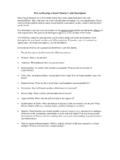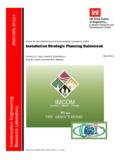Transcription of Hargrove & Associates Management Consultants …
1 Executive Assessment Sally Sample Hargrove & Associates Management Consultants Consulting Copyright 2003 All rights reserved Hargrove & Associates Management Consultants Executive Coach s Final Report Sally M. Sample Regional Director, Any Corporation Introduction and Purpose Executive Coaching is a collaborative partnership between a middle to upper-level executive, her or her organization and the professional coach. The purpose of ther partnership is to: Develop individual managerial talent Achieve identified business results Appropriate targets for coaching are those high potential individuals with the need to leverage current strengths and build key competencies to achieve strategic objectives.
2 These individuals have high potential for impacting the company s performance and effecting business results. They have a commitment for achieving personal growth and development. The coaching process typically covers a six-month time frame, but may be extended as circumstances dictate and if objectives have not been met. HMC Coaches work closely with senior managers and HR Departments to modify assessment and coaching services, as necessary, to ensure that the objectives of the individual and the sponsoring company are achieved. The coaching process includes the following phases: Phase 1 Information Gathering and Assessment. The process involves the use of personality tests such as the California Personality Inventory (CPI), in-depth background interview, 360 feedback interviews with direct reports, selected peers and relevant others as indicated, on-the-job observation and an in-depth meeting with the supervising manager.
3 Phase 2 Development Plan Once the performance gaps are identified, a customized road map for addressing development needs is created. The plan is discussed and agreed upon by the coached individual, their supervising manager and other relevant persons from whom support is required. Phase 3 Coaching and Monitoring Performance. The executive engages in activities designed to enhance self-awareness, build competencies, and achieve results. Regular meetings are scheduled with on-going access to coach for advice, support, monitoring and feedback. Phase 4 Evaluation and Follow-up Progress toward achievement of objectives is measured. A long-range plan identifying future areas of focus is developed and discussed. Hargrove & Associates Management Consultants Consulting Copyright 2003 All rights reserved 2 Coaching Overview This report describes the coaching relationship between Sally Sample and her Executive Coach, Faye Hargrove during the period of June through December 2003.
4 During the six-month period Sally was extremely committed to strengthening her leadership profile and was able to implement many adaptations to her leadership style in a short period of time. Phase I ---Assessment Sally s assessment was completed in June 2003 and included the following components: 1. The coaching process began with separate in-depth interviews with Sally and her manager on June 1, 2003. The interview was designed to establish goals and expectations for the coaching outcomes and to assess Sally s and her manager s perception of current areas of strength and development opportunities. 2. The California Psychological Inventory (CPI)-- The CPI is a self-administered questionnaire that measures multiple dimensions of an individual's style as it might relate to work, relationships, or life in general.
5 Individuals taking the inventory answer questions in terms of beliefs, values, preferences, and past behaviors. As such, the CPI is a "self-presentation" of a person's interpersonal style, or personality. The CPI report is designed to increase the manager s awareness about the personality characteristics that can drive specific behaviors and contribute to Management and leadership styles. 3. 360 Feedback Interviews-- The 360 assessment is a vehicle for providing managers with an honest assessment of their Management behavior from those most directly affected by it: their peers, direct reports and superiors. It is a valuable tool for providing tangible insights into a person's assets and limitations and to assist in creating developmental plans.
6 It allows managers to discover important gaps that may exist between their own perceptions and those of their co-workers in terms of how they are behaving on a daily basis.. Face-to-face 360 interviews were conducted with each of her direct reports, peers, and managers (See results in Appendix B). The 360 interview questions were centered around the Any Corporation Eight Leadership Essentials. 4. Behavioral Observation/Shadowing The shadowing process provides an opportunity to observe the manner in which Sally demonstrates the Any Corporation Leadership Competencies on a daily basis. Sally was observed as she conducted staff meetings and participated with peers and other executive Management . Observations of her communication style---including platform skills, her impact on others, the manner in which she provides direction, feedback and follow-up with her subordinates, relationship building, etc.
7 , were used as input in the coaching process. Assessment Results Personal Style Sally s personal style is friendly and pleasant, characterized by high initiative and self-confidence. In general, she is highly regarded by her peers, direct reports and upper Management . She is quite articulate and has no difficulty making herself understood in either group or individual settings. She Hargrove & Associates Management Consultants Consulting Copyright 2003 All rights reserved 3often shoots from the hip, and may not take care to use the appropriate level of diplomacy and tact, however. She is aggressive and passionate about achieving the desired results for her organization. Sally demonstrates an interest in and concern for others, particularly her direct reports.
8 They perceive him as caring and fair. She is goal-oriented, conscientious and dependable. She is willing to assume significant responsibility and committed to quality results in her organization. Interacting with Others Sally is supportive of her direct reports and frequently makes opportunities to provide public recognition and thank them and others for their contributions. Her focus is often centered on the task at hand, however, and she does not take the time to build the necessary foundation of relationships before forging ahead in a particular direction. This is particularly true with her peers. She appears to be more interested in seeing the task accomplished than in seeking out individual perspectives and concerns. Sally wields only limited influence over others, especially in her peer group.
9 Her passion for achieving results may get in her way and she attempts to get her ideas across without stopping to ensure that others are on board. Sally tends to be concrete in her approach to others and to accept behavior at face value. She does not read others well, can often be oblivious to social nuances and therefore may not be politically astute. On the other hand, Sally works hard at, and is successful in, molding a cohesive unit of her direct reports Decision Making Sally is organized and structured in her approach to work. She demonstrates a mental agility which enables him to develop new and untested approaches to old problems. She tenaciously attends to each daily task and may not always prioritize her time based on issues that are both urgent and critical to her unit.
10 While Sally can execute an effective plan to achieve the desired results, her focus is frequently short term without always formulating a long term strategy for her organization. She is not afraid to question organizational norms and take a stand on an issue, even when faced with opposition. Sally is not restricted to traditional thinking when it comes to problem solving. While Sally makes effective decisions, she often acts too quickly before gathering the necessary input or support from others. Likewise, when others challenge her thinking she goes on the offensive rather than attempting to negotiate and find common ground for agreement. Phase 2---Development Plan Assessment results provided evidence of Sally s strengths and opportunities for development.







